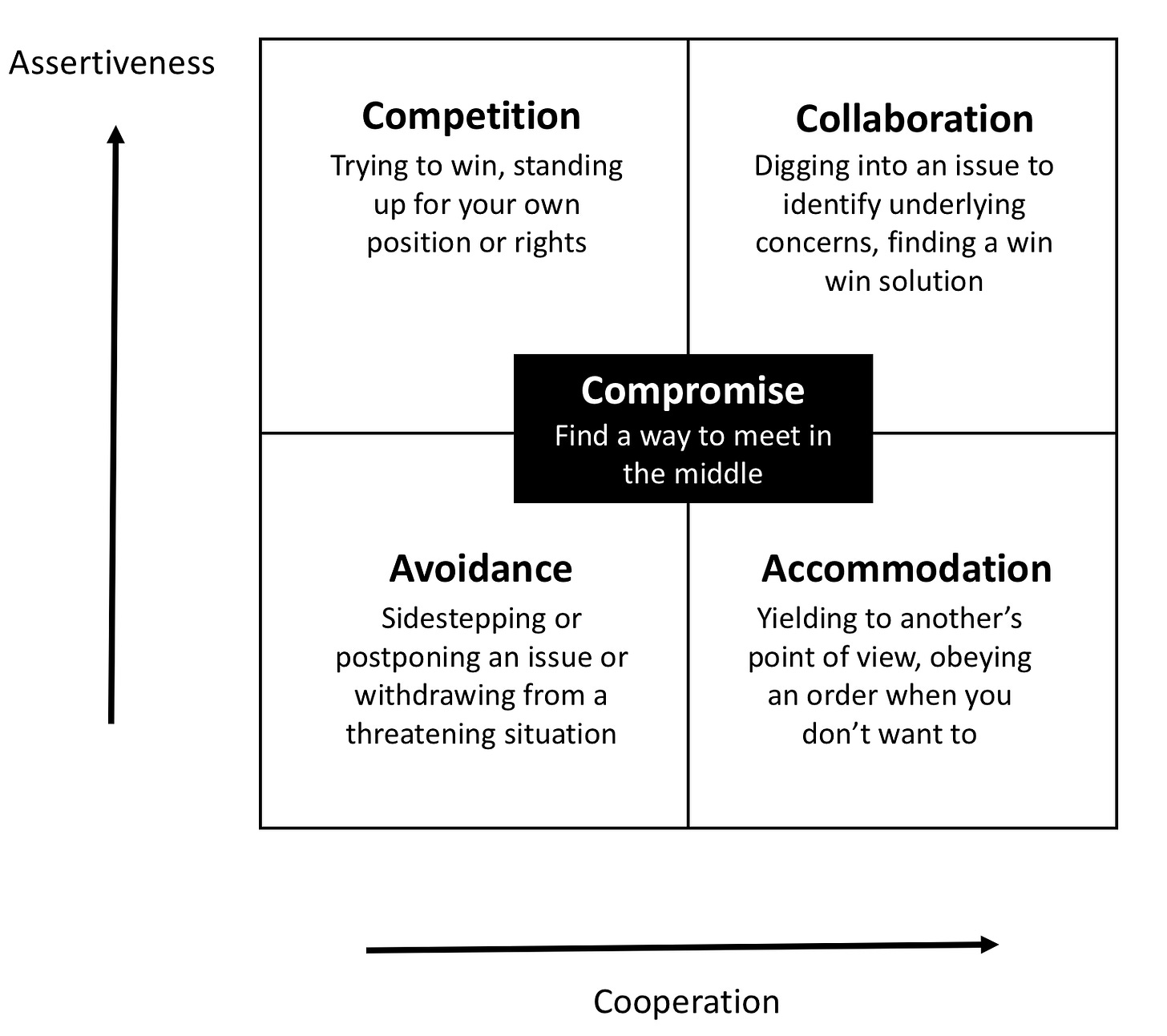The 5 Principles of a Negotiation
Understanding the five principles of a negotiation will help you strategize your approach and help you achieve the desired outcome.
Key Takeaways
We can compete, accommodate, avoid, or compromise, but the ideal strategy for parties in the negotiation is to collaborate.
Collaboration or win-win negotiation is often seen as the ideal negotiating strategy, but sometimes a compromise is good enough.
Thomas and Killman developed five strategies by looking at two dimensions.
The first is concern for the outcome of the negotiation, or indeed a conflict which they called assertiveness.
The second is concerned for the relationship between the parties, which they called cooperation.
If you draw a chart of assertiveness against cooperation, you can see there are five different zones: Competition, Accommodation, Avoidance, Compromise, and Collaboration.
Competition
The first zone is competing. The competing strategy is suitable, where the outcome is far more important than the long-term relationship.
For example, if you are in a one off transaction, then you will try to get the best possible outcome for your organization. If you're buying, you will want the cheapest price and the best quality goods. If you're selling, you'll be looking to get the highest possible price.
However, competing is not always appropriate if the long-term relationship is of high importance. This is because if you or the other party feels that the outcome of this negotiation isn't strongly to their advantage, they may be unwilling to negotiate in good faith in future.
Accommodation
At the other end of the spectrum, if the long-term relationship is far more important than the outcome of this particular negotiation, you may adopt an accommodating strategy. One that says: we're prepared to accept less than the ideal outcome from this negotiation if it helps to build a long-term relationship.
This is where you might be offering a service or goods at lower than a normal cost in order to build the relationship with the buyer. As a buyer, you may be prepared to offer a better chunk of work to a supplier so that you can build a long-term relationship and lock in a good quality supplier into your supply chain.
Avoidance
The next strategy is to avoid negotiation. Sometimes it just isn't worth the effort. The outcome you're looking for isn't that important to your organization. The relationship isn't that important. Therefore, rather than negotiate, you just do the deal quickly.
Often, this means procuring something from a catalogue, a website, or a store without negotiating at all. If you waste time on negotiations where the benefit that you gain from the negotiation is marginal, then you won't have as much time to spend on negotiations where there is a significant advantage to be achieved.
Compromise
If both the long-term relationship and the outcome are important, but not paramount, then we come to a compromise. A compromise is where both parties are prepared to give something up in order to get a deal. But a compromise works when what I give up and what you give up are both equal and feel fair.
A compromise is fair when I'm giving up as much as you're giving up and we're both equally content that a fair deal has been had.
Collaboration
The fifth strategy is collaboration. This is where the long-term relationship is of paramount importance, but so is the outcome. It's worth investing the time and effort to work together to get the best possible outcome for both parties.
The difference between collaboration and compromise is:
in compromise, we are both prepared to give up as much as the other
in collaboration we are are both prepared to contribute more to the transaction and what we both contribute is of equal value.
Collaboration or win-win negotiation is often seen as the ideal negotiating strategy. However, it isn't always the right strategy because it takes a lot of time, effort, and commitment to collaborate. You're both looking for things you can contribute to the negotiation to make it better. This is could be hard work and sometimes isn't justified; where a compromise is good enough.
Kenneth Thomas and Ralph Killman suggests that we can compete, accommodate, avoid, or compromise, but the ideal zone for negotiations is to collaborate.



